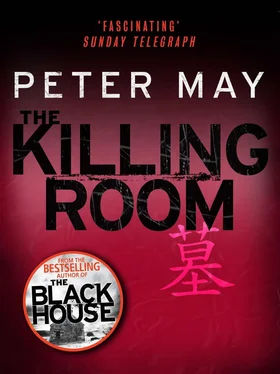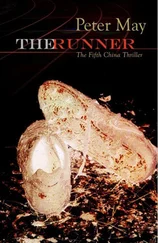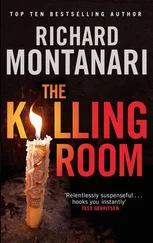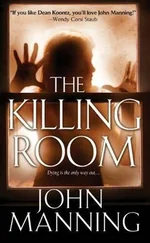Peter May - The Killing Room
Здесь есть возможность читать онлайн «Peter May - The Killing Room» весь текст электронной книги совершенно бесплатно (целиком полную версию без сокращений). В некоторых случаях можно слушать аудио, скачать через торрент в формате fb2 и присутствует краткое содержание. Год выпуска: 2012, Издательство: Quercus, Жанр: Триллер, на английском языке. Описание произведения, (предисловие) а так же отзывы посетителей доступны на портале библиотеки ЛибКат.
- Название:The Killing Room
- Автор:
- Издательство:Quercus
- Жанр:
- Год:2012
- ISBN:нет данных
- Рейтинг книги:5 / 5. Голосов: 1
-
Избранное:Добавить в избранное
- Отзывы:
-
Ваша оценка:
- 100
- 1
- 2
- 3
- 4
- 5
The Killing Room: краткое содержание, описание и аннотация
Предлагаем к чтению аннотацию, описание, краткое содержание или предисловие (зависит от того, что написал сам автор книги «The Killing Room»). Если вы не нашли необходимую информацию о книге — напишите в комментариях, мы постараемся отыскать её.
The Killing Room — читать онлайн бесплатно полную книгу (весь текст) целиком
Ниже представлен текст книги, разбитый по страницам. Система сохранения места последней прочитанной страницы, позволяет с удобством читать онлайн бесплатно книгу «The Killing Room», без необходимости каждый раз заново искать на чём Вы остановились. Поставьте закладку, и сможете в любой момент перейти на страницу, на которой закончили чтение.
Интервал:
Закладка:
The Bund was deserted, and without its light show as dull as any city street anywhere in the world, all colour bled out of it by the pervasive yellow of the sodium street lights. Gone were the green, yellow and blue floodlights, the giant neon ads that just a few hours ago had shone brilliantly against the night sky. Maxell, L’Oréal Paris, Sharp, Nescafé . Gone were the teeming crowds of tourists and Shanghainese that constantly ebbed and flowed along the length of the promenade. Across the river, only the red winking navigation lights on the tops of buildings betrayed the existence of the financial miracle that was Pudong. The six lanes of the Bund were eerily empty. The clock face on the tower halfway along glowed like a pale moon rising over the deserted city. It was nearly a quarter to four.
An occasional cyclist drifted past, heading perhaps for an early shift at some factory. The odd taxi cruised by, slowing down as it passed Margaret on the sidewalk, its driver leaning over expecting her to signal that she wanted a lift. It was inconceivable that some yangguizzi would wander the empty streets at four in the morning without requiring a taxi. She waved them all on.
Half a dozen cabs were pulled into the kerb opposite the end of Nanjing Road, on the river side of the Bund. A woman in a white jacket and round white hat squatted on a stool by a brazier. A large pot of soup bubbled and steamed on top of the coals, and she filled mugs from it with a ladle for the drivers who stood around talking and smoking and stamping their feet in the early morning chill.
The drivers watched curiously as Margaret looked both ways along the Bund before running across the six lanes, pausing only briefly at the central reservation. There was no traffic, only the distant lights of a truck approaching from the direction of the Nanpu Bridge. All conversation around the brazier had come to a halt. For a moment, perhaps, they thought she was going to ask for some soup. But she hurried past, running quickly up the steps to the long, deserted promenade. It was darker here, away from the street lights. Umbrellas still stood open at stands where earlier vendors had sold drinks and snacks and Fuji film. Now there was not a soul in sight. An elaborate fountain, usually illuminated by green lights, had been switched off. She crossed to lean on the wall and look out over the black waters of the river. A heavily laden barge chugged by, so low in the water it was hard to believe it would not sink. There was one small lamp burning in the pilot’s cabin, but no navigation lights. From somewhere a long way upriver came the blast of a ship’s foghorn.
She breathed deeply and was sure she could smell the sea, which was not so far away in the Yangtse River estuary. She walked slowly north along the promenade, arms crossed, hugging herself to keep warm. A deep depression had settled on her. Li was the only reason she had ever stayed in China. The only reason she had come back. Without him there was no reason to be here. Ever. She didn’t even want to contemplate the possibility of what she would do if she lost him. ‘Home’ had seemed so alien to her during the few days she had been back there. And yet she could not bring herself to think of China as home. She felt displaced and, although her mother was still alive, orphaned by the death of her father, as if her anchor chains had been severed and she had been cast adrift on an uncharted sea. God knew what shore she would wash up on. All she could do, she thought, was go with the flow, let the currents take her where they would. There was no point in fighting against them. It was futile and exhausting. She would complete her work on the Shanghai murders, re-autopsy the body in Beijing, bring Xinxin back south and then see what happened. If Li was really drawn to Mei-Ling, then she knew she couldn’t compete. As she had told Jack, they both swam in very different pools.
She reached the gates of Huangpu Park. They were locked. And beyond them, in the dark, she could just see the Shanghai People’s Hero Memorial Pagoda in the reflected light of the streetlamps. There were trees and shrubs here that screened the promenade from the road. The occasional passing vehicle seemed very distant. And on the other side of the wall, the river slapped dully, erratically, against the stone. The sound of movement in the darkness of the bushes startled Margaret. She stood stock still. Had it been an animal? But she wasn’t going to stay to find out. She turned and started walking quickly, back the way she had come. The moonface on the clock tower was a very long way away. She had come further than she thought. She didn’t look back for a long time, concentrating on controlling an urge to run. It had probably been a dog, or maybe even a rat. She glanced over her shoulder for reassurance, and saw, about a hundred metres back, the shadowy figure of a man hurrying in her wake. She almost screamed, and now had no difficulty giving in to her impulse to run. She ran until she reached the dry bed of the fountain and looked back again. But there was no one there. No sound or sign of movement. She stopped to regain her breath, momentarily relieved. Had she just imagined it? She decided to get down on to the sidewalk and the lit, wide open space of the road. In the distance she could see, still gathered around the soup pot, about half a dozen drivers. They were almost within shouting distance. She ran down a flight of steps, passing the entrance to an underpass, walls lined with illuminated posters that threw out a strong, bright light. A movement in her peripheral vision caused her to turn, catching her breath, and for a moment she saw a man’s face, caught full in the light of the underpass. He was short and thick-set, with long, straggling hair and a broad, flat, Mongolian face. His eyes were like black slits. She could see no light in them, and the upper half of his mouth was stretched over brown, protruding teeth, turned up and horribly distorted by the ugly scarring of a hare-lip. He froze, like a rabbit caught in headlights. She would have screamed, but she couldn’t seem to find a breath. For what felt like an incredibly long moment, their eyes met. She could almost have reached out and touched him. And then she turned and ran down the rest of the steps to the sidewalk and sprinted towards the little gathering of taxi drivers drinking soup.
By the time she reached them they had all turned and were staring at her in astonishment. She slowed to a stop, gasping, her lungs burning. She turned around and the street behind her was empty. Not a soul nor a vehicle in sight. She turned back to meet the curious faces of the drivers and the soup lady who gaped in wonder at this blonde-haired blue-eyed woman out running in the middle of the night. For an absurd moment she wondered if they had thought she was jogging. It was clear from their expressions they thought she was insane. She glanced back, but there was still no sign of the man with the hare-lip. She fought to bring her breathing back under control and tried a half smile that she knew was probably more like a grimace. Still they stared at her in mute amazement, some of them holding mugs in suspended animation, halfway to their mouths. She felt compelled to say something and muttered, absurdly, ‘ Ni hau .’
Compelled, out of habit, to respond to a foreigner saying hello in Chinese, they mumbled ni hau in return. She looked either way along the road, and then forced herself to walk calmly across it. She could almost feel their eyes on her back.
She passed the lights of a twenty-four-hour Citibank, with a row of glowing ATMs behind sliding glass doors. Inside, a night watchman was reading a book and playing loud music. She turned up Nanjing Road and took one final look back. There was no one there except for the taxi drivers and the soup lady. She pushed, relieved, through the revolving doors of the Peace Hotel and realised that in all the months she had spent in China, this was the first time she had felt any sense of threat in the streets.
Читать дальшеИнтервал:
Закладка:
Похожие книги на «The Killing Room»
Представляем Вашему вниманию похожие книги на «The Killing Room» списком для выбора. Мы отобрали схожую по названию и смыслу литературу в надежде предоставить читателям больше вариантов отыскать новые, интересные, ещё непрочитанные произведения.
Обсуждение, отзывы о книге «The Killing Room» и просто собственные мнения читателей. Оставьте ваши комментарии, напишите, что Вы думаете о произведении, его смысле или главных героях. Укажите что конкретно понравилось, а что нет, и почему Вы так считаете.












